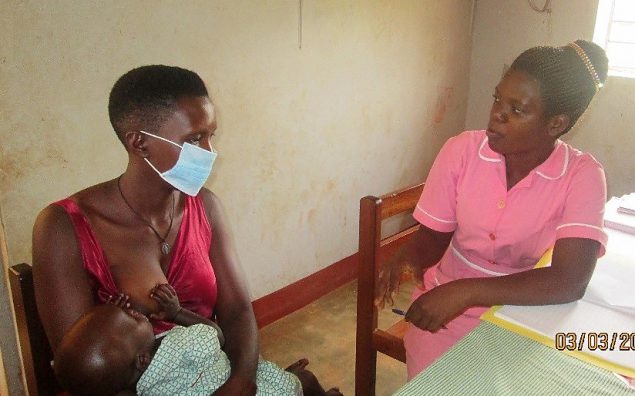Integrating TB Services into Maternal and Child Health Clinics in Rural Uganda

Integrating TB Services into Maternal and Child Health Clinics in Rural Uganda
Jane Nyangoma is a 37-year-old mother of five children who was diagnosed with tuberculosis (TB) while attending the post-natal clinic at a rural health facility in western Uganda. Jane is HIV-positive and was accessing elimination of mother-to-child transmission (eMTCT) services at the same facility.
Prior to her TB diagnosis, Jane came to the health facility with a cough, intermittent fevers, chest pain, and night sweats. The midwife who was providing eMTCT services to Jane recommended a sputum test, and she was referred to a nearby lab with a GeneXpert diagnostic machine to test for TB. The test confirmed that Jane had TB.
Jane was started on appropriate medication for treating TB – rifampicin, isoniazid, pyrazinamide, and ethambutol. Her husband and children were also screened for TB using the intensified TB case-finding form; thankfully, all of them were free of any TB symptoms.
”If the midwife that day hadn’t sent me to the lab, I think I wouldn’t be alive today,” said Jane. ”I was very sick and worried about my children.”
To prevent further transmission, Jane was provided with surgical masks to cover her mouth and nose while breastfeeding. Her four-month old baby was also provided with isoniazid preventive therapy (IPT). After two months on treatment Jane had a follow-up sputum test which showed no TB.
Jane successfully completed her treatment and was declared cured of TB after having two negative sputum samples during and at the end of her treatment. Her symptoms resolved and she soon gained weight. The baby also completed the necessary six months of IPT.
Jane is one of the 8,000 mothers in western Uganda receiving eMTCT services who are seen every year and screened for TB at clinics supported by the Infectious Diseases Institute (IDI), a CDC-funded implementing partner under the President’s Emergency Plan for AIDS Relief. Until three years ago, not all women attending antenatal and postnatal services in this region were routinely assessed for TB symptoms, nor was their care managed within appropriate maternal and child health (MCH) clinics.
Then, in 2016, following issuance of Ministry of Health guidelines for integrating TB services into MCH clinics, IDI (with support from CDC) trained 400 midwives at 230 supported health facilities to integrate TB diagnosis and management into eMTCT services. IDI also continues to provide job aids and tools to monitor the integration of TB services into MCH clinics as well as technical support the midwives to provide TB services according to national guidelines.
As Sister Mildred, a midwife working in these MCH clinics, put it, “I had never thought of TB while reviewing mothers in antenatal or postnatal care. But I started assessing the mothers for TB symptoms after attending the three-day training in TB diagnosis and management conducted at my facility. I am so happy that I was able to help.”